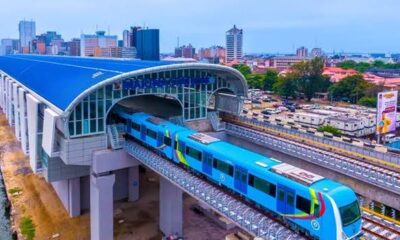NEWS
Lagos state government demolishes shops under burnt Apongbon bridge

The Apongbon Bridge was razed by fire on March 23 due to activities of the traders, leading the Federal and the Lagos State Governments to issue a seven-day eviction notice to the traders with shops under the bridge.
The Lagos State Government (LASG) on Friday has however demolished shops and other structures constructed under the burnt Apongbon Bridge. as early as 9.00 a.m. on Friday, April 29. The Lagos State Taskforce moved to the site with their bulldozers, and demolished the shops.
Gov. Babajide Sanwo-Olu had, on March 27, given the traders a three-day ultimatum to vacate or risk demolition of their shops.
Security officials were seen assembled at the foot of the burnt bridge in their patrol vehicles, monitoring the demolition of the shops and other structures.
Other shop owners and traders in the shops across the road from the bridge were not allowed to open for business.
Also, the Lagos Waste Management Authority (LAWMA) personnel were on ground to clear the rubble from the demolished structures into their waiting vans.
One of the displaced shop owners, Mr Theophilus Best, said that they could not fight government for demolishing the shops, adding that he, however, prayed that the government would relocate them to a new site.
Best, who is a wholesales margarine/butter trader, said that since the fire incident, he had been sharing a shop with his friend.
“I believe once there is life, there is hope for me and others affected,” he said.
Another affected trader, Mr Ifeanyi Okoye, who sells baking ingredients, appealed to the state government to relocate them to a new site where they would continue their trading.
Okoye said that since the government announced its intention to demolish the shops at the site, he had packed some of his goods that were not affected by the fire to a temporary site.



























